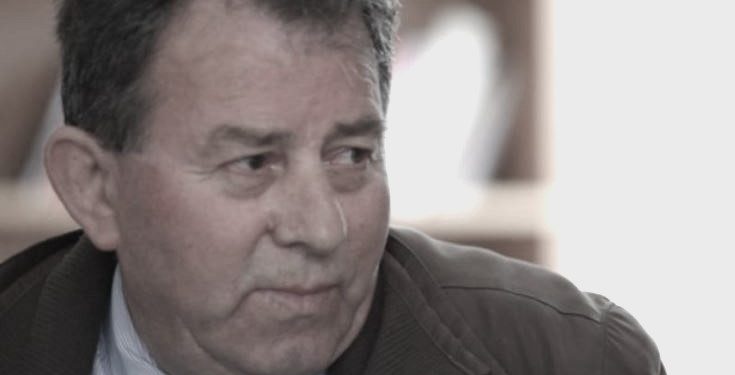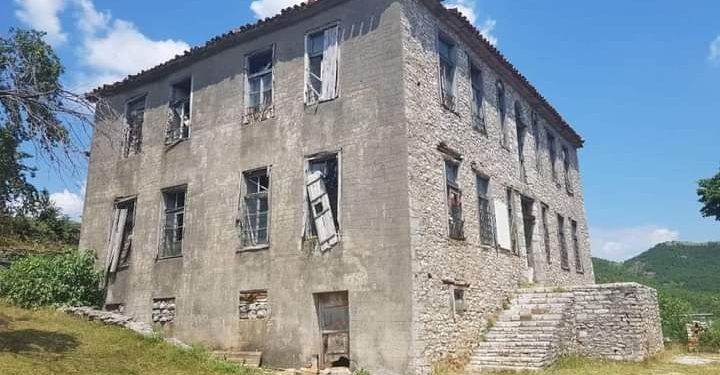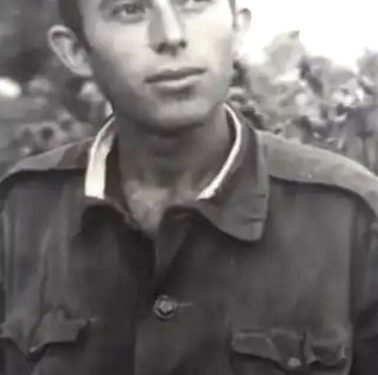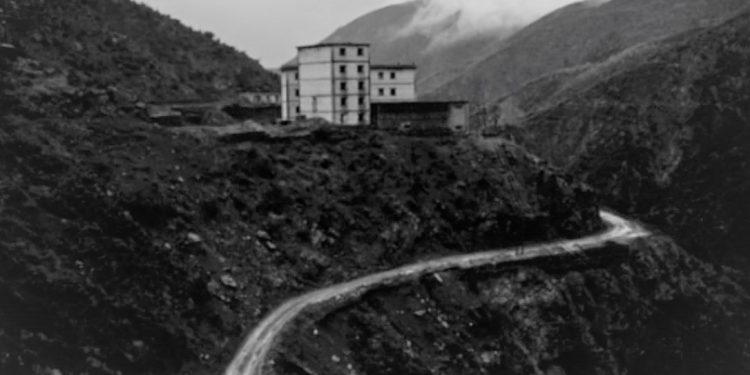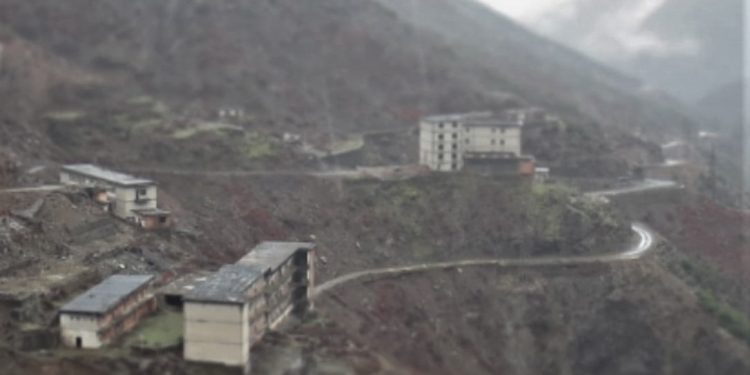By Shkëlqim Abazi
Part forty-five
Memorie.al / I were born on 12. 23. 1951, in the black month, of the time of mourning, under the blackest communist regime. On September 23, 1968, the sadistic chief investigator, Llambi Gegeni, the ruthless investigator Shyqyri Çoku, and the cruel prosecutor, Thoma Tutulani, brutalized me at the Branch of Internal Affairs in Shkodër, they split my head, blinded one eye, deafened one ear, after breaking several ribs, half of my molar teeth, and the thumb of my left hand. On October 23, 1968, they took me to court, where the pitiful Faik Minarolli gave me a ten-year political prison sentence. After half of the sentence was cut, because I was still a minor, sixteen years old, on November 23, 1968, they sent me to the political camp of Reps, and from there, on September 23, 1970, to the Spaçi camp, where on May 23, 1973, during the revolt of the political prisoners, four martyrs were condemned to death and executed by firing squad: Pal Zefi, Skënder Daja, Hajri Pashaj, and Dervish Bejko.
On June 23, 2013, the Democratic Party lost the elections, a process more than normal in the democracy we aspire to. But on October 23, 2013, the General Director of the “Renaissance” government sent Order No. 2203, dated 10.23.2013, for the release from duty of a police officer. Thus, Divine Providence was interwoven with the Neo-communist “Renaissance” Providence and, precisely on the 23rd; I was replaced by, no less and no more, but the former Security operative of the Burrel Prison. What could be more significant than that?! The former political prisoner is replaced by the former persecutor!
The Author
SHKËLQIM ABAZI
R E P S I
(Forced Labor Camp)
The First Meeting
(The Boat Sunk in the Trough)
Continuation of Richard Richy (The American Polyglot)
It was enough to earn Riçi’s trust to call you a friend; but a friend according to the American concept, which is diametrically opposed to ours. When we call someone a friend, we make every sacrifice to justify the friendship, whereas he was utterly indifferent, perhaps as a result of the great disappointments before prison. Nevertheless, I can confidently state that I enjoyed Riçi’s sympathy; for him to offer you half a cigarette meant a lot, and I had this privilege.
Riçi the teacher was the antipode of Riçi the individual. When you saw that substantial change, you were surprised and asked yourself:
“What could have happened in the subconscious of this individual?! What centrifugal or centripetal forces were acting in the orbits of this creature’s brain, suddenly transforming him from a man-animal who ate whatever he could find, who drank shamelessly from any cup, who cohabited with colonies of mice, swarms of flies, battalions of lice, and countless bedbugs without being bothered at all-a being who only vegetated to eat, and who even performed biological necessities wherever he was, without the slightest sense of shame, and who greeted even the loudest flatulence with: ‘salute Riçi‘-into a gentleman the moment he picked up books? He would be clad in a delicate armor, worthy of courtiers, finding some fine expressions, with chosen and refined phrases, like the dignified old ladies?!”
When I first noticed this essential transformation, I tortured myself with the question: “What can happen to the subconscious of an individual who saw the light of the sun in a free country, and is suddenly found under state violence?” But I couldn’t find a satisfactory answer, so I cursed: “Cursed be the systems that influence characters, cursed be the terror that alters personalities; cursed be communism as theory and practice which, with the barren illusion of parasitism, eclipsed the brains of almost half the globe, and produced in abundance parasites, demagogues, and charlatans; cursed be this system of violence; cursed even be the West, which for pragmatic purposes, stimulated the red plague to engulf boundless spaces and turn noble beings into undignified beasts, brainwashed and cruel!”
When we sat down with books or talked about them, Riçi felt like a fish in water; he seemed to rejuvenate and gain a new aura. He would cast the vocabulary of daily use into the deepest recesses of his subconscious, like those unwashed rags in closed baskets; he would laugh, renew himself, and take on a different glow. Then he would start the explanation, dissecting the entire day’s lesson in detail; with a vocabulary perfect to perfection, he would begin comparisons with the other languages he knew: English, Italian, and Spanish. He would analyze with professional competence the origin of unfamiliar words, delving into the Latin roots of nouns, adjectives, pronouns, and adverbs, conjugating the auxiliary, transitive, and intransitive verbs in all tenses and moods in all the languages he knew. I followed him open-mouthed, amazed by this extensive knowledge!
In the end, I was the winner. After every consultation with him, the next lesson seemed easier, not only that one but also several that followed. Like a strategic chess player who, after the current move, anticipates several subsequent positions on the board, he instilled the mystery of anticipation. By nature, Riçi was a classic slacker, so it wasn’t easy to settle down with him. This was also because he spent his time gathering and manipulating bread crusts and other food, depending on the season. Since he had accredited me with the right to consult him, a privilege not everyone enjoyed, to compensate him in a way, I offered him some material favor, such as a packet of tobacco, a bread ration, or a kilogram of sugar or rice, which he accepted with pleasure, and naturally, with mutual willingness, in exchange, I exploited the maximum minute-time.
When a chapter that had tortured me for weeks closed, I finalized the concluding process with Riçi. This was ultimately a mastered chapter and many corrected pronunciation errors, especially in mastering accents, where I felt weak. Months later, I would make a pact with Riçi: every Sunday morning, if they gave us a break or didn’t conduct a search, I would consult with him. Riçi was an excellent methodologist, but a low-level literary man. He practiced word-for-word translation or with synonyms, but never free translation. This method was difficult but very fruitful, because you maximized your vocabulary, and when you finished the chapter, you understood that the effort hadn’t been wasted; you had acquired a host of new words and countless idioms. Therefore, Riçi was a teacher of prose, not poetry:
“Poetry requires fantasy, my friend! It demands improvisational spaces, but this is allowed only to ethereal poets, not to exemplary students,” he reasoned. Like it or not, with Riçi, I had to bid farewell to my weakness-poetry. Nevertheless, his lessons were extremely valuable to me.
The True French Teacher: Ilia Iljadhi
It is no coincidence that I left the two emblematic figures of the prison school for the end. Ilia were about fifty years old when I met him. During the War years, like all Albanian youth, he had been infected with communist ideas and was engaged in the liberation of the country from Fascist Italy and then from Nazi Germany. He had joined the ranks of the partisan forces, even achieving a career in the hierarchy of ranks.
He had left his birthplace, Çarshovë in Përmet, when he was young. He started working at the oil company ‘A.I.P.A.’, where, thanks to the support of his fellow villagers working there, and his own abilities, he achieved desirable positions, both in work and society. Collaboration with Italian and other foreign engineers and specialists brought him into contact with the most advanced world culture of the time. As a clever, intelligent, and eager-to-learn young man, he quickly earned the trust of the company officials, who sent him for advanced specializations in Italy and several times in France. Ilia possessed special intellectual qualities and adaptability in any social group where his work connected him, so he gained the goodwill of his hosts and managed to enter intellectual circles in large Western cities.
Naturally, at that time, the youth of those countries were buzzing with new ideas, so he established close contacts with the Jacobin communist groups, and consequently, returned to the Fatherland with the convictions of a twenty-four-carat socialist.
In Albania, during the late years of the second and third decades of the twentieth century, a leftist movement also emerged, inspired and led by individuals with anarchist tendencies who, in the mid-twenties, had been political opponents of Ahmet Zogu, consequently supporters of Fan Noli’s anti-constitutional movement. With Zogu’s return, these people fled and found refuge in various European countries. Economically desperate, the spineless fugitives became easy prey for Soviet counter-espionage, which thus found the ready material to prepare for the expected world revolution. They invested in their survival, and some were even brought to Moscow, where they were educated and employed to be indoctrinated and infected with subversive ideas, which were later to be returned to their country of origin to unsettle public opinion with communist propaganda and utopian ideas.
Thus, these individuals, although without reputation in their own country, imported Bolshevism and stimulated the anarchist movement which, although chaotic and lacking a clear ideological axis, was embraced and supported by the new generation of the time. But many students from the middle classes, educated with state scholarships in Western universities, also brought leftist ideas from the countries where they studied along with their diplomas. The newcomers hoped to find their corner, but when they found themselves stranded like a fish on the shore, they joined the former Eastern fugitives from after ’24 and created some anti-state communist-anarchist groupings.
Being an amalgam of snobs, loudmouths from rich or fallen-from-grace families, spoiled parvenus in their birthplace but unknown in patriarchal cities where doors are not easily opened, as well as a group of adventurers and ordinary petty criminals, they could not organize into a political party because they were always contradicting each other, elbowing one another to be the first. Ilia joined these groups, but he was among the few who did not demonstrate tendencies of this nature, though he did not judge badly the members who displayed these signs.
Initially, he considered the squabbles among them to be a clash of ideas that would serve to strengthen internal democracy and that time it would neutralize. During the period in question, the press enjoyed freedom. But in this undefined field, all sorts of ideas and many ambitious and unscrupulous individuals swarmed. It was a time when the kingdom was laying the foundations of a new democratic system, radical reforms were being made in all spheres, and governments changed every season.
Many individuals from the old system, especially in the army and gendarmerie, moved to open revolutionary actions; consequently, the event that has entered history with the inaccurate name, the “Fier Uprising,” occurred, because in fact, it was only a revolt of officers released from duty, within the framework of the reforms undertaken by King Zog for the qualitative restructuring of the armed forces and the relief of the fiscal burden. This and other actions incited and financed by foreign intelligence services, especially the Italian ones, aimed to destabilize the impoverished Albanian state to enable an eventual intervention by the Italian invaders, which forced the government of that time to take some coercive measures against these disturbing elements.
When a group of pseudo-communist young men, who sought power through a Bolshevik revolution, ended up behind bars and accused each other in court, they were punished with ridiculous penalties, such as internment in the quarries of Mbreshtan in Berat, where they ate chickens and lambs on a spit. Ilia concluded that the royal regime had been lenient with his group, so he intensified the propaganda against the Kingdom. Regional conjunctures were not in favor of the government, but of these individuals with anti-fascist tendencies and their masters abroad, which was proven on the black Friday of April 7, 1939, when a well-equipped army of several hundred thousand attacked and occupied a battered micro-state.
The vast majority of those affected by the royal reforms welcomed the occupation, so the very next day, on April 8, they wore black shirts and joined the ranks of the militia and the fascist party. But this major event changed the course of the waters, shattering the whole power-dream of our communists. For two or three years, the country fell silent, and the ‘power aspirants’ also felt comfortable; it seems their ambitions were fulfilled and the black shirts they wore fit them perfectly.
To illustrate this fact, Ilia would tell me: “Some sick nationalists with some rusty rifles sprang up in those days, and they fired some shots here and there along the coast and then propagandized for Ethnic Albania and separation from the Lictor’s axe. In the end, they quickly found their place, as the mule asks for wood; they were sent to internment in Ventotene and some of the more distant islands and were left there like poor wretches, at the mercy of fate! Albania, as an integral part of the Kingdom of Savoy, was prospering; roads, waterworks, and various public constructions were being built, which influenced the rise of general well-being. It was futile to propagate against the current; people rejoiced over Paninis and pasta; full work, full money, full bread! Plus, they even made the children balilla (fascist youth) and took them for swims on the Italian beaches! The Albanian communists were completely silent! In the end, Mother Russia was lounging in peace, and the Comintern gave the orders!” Ilia told me.
“It took the breaking of the Ribbentrop-Molotov Pact, which brought Germany and the Soviet Union into war, for the organization of some fragmented communists to begin here too. Two Yugoslav emissaries appeared from somewhere, who insisted on uniting several groups and, overnight, hastily formed the Communist Party, as a branch of the Yugoslav communists!” Thus, Ilia also found himself in this whirlpool. With some comrades of the ideal, they formed guerrilla units for the Berat-Kuçovë area and carried out some small actions, just to make their presence felt. This was the beginning!
“Then the dimensions of the war grew with new forms and forces. The opening of the Western front put the Anglo-Americans into action, who could not leave Albania out of attention. Their advance guards landed here and encouraged the territorial forces in the war against the common enemies. Initially, everything went smoothly, but after the Roosevelt-Churchill-Stalin meeting in Yalta, the fates of the world changed; geopolitics decided over geostrategy. Albania remained under Eastern-communist domination. Thus, the reports sketched on paper predetermined the winners and losers.
The Bolshevik forces saw themselves as privileged by the allies, both in the supply of weapons and in aid with money and food. The leaders were preparing to take power, so amidst the delirium of victory, they assigned the chairs. But they never stopped elbowing each other, they never ceased the intrigues; they remained the same as in the time of the groups. Some underground moles, who achieved nothing, stole the merits of others with various tricks; the sacrificers, for the sake of unity, remained silent. Thus, the expression, ‘who farted and who took the money,’ found no more suitable place to be applied than among this formation!” Ilia continued the narrative.
Ilia, along with some hotheads like Stavri Cylaku and others, turned their unit into a battalion and baptized it with the name of a young girl killed while fleeing in Gosë of Kavajë, so they called it the ‘Margarita Tutulani’ battalion. It is an undeniable fact that, even though they didn’t do anything extraordinary, this battalion had men who, in those few actions, fought bravely on foot. I would have the commander of this battalion, Stavri Cylaku, as a co-sufferer and friend until the day he closed his eyes on the eve of democracy. As a fellow citizen and close friend of my father, he would tell me details of the war epic of this battalion, and deeply disappointed, after over thirty years of prison, he would confess:
“Ah, what these have done? (He meant the communists). Neither a river nor a sea can wash it away! The ninety-nine percent! If you have been a communist for one year, you need ten years of political prison to wash your soul clean! I, who was a militant for a few years, even though they imprisoned me for over thirty years, couldn’t wash it clean!”
I don’t think this outburst needs commentary. But let’s leave it for another chapter and return to Ilia. Ilia emerged from the war with decorations and titles, but he left all of them to return to Kuçovë, where he had started his career and where a beloved girl was waiting for him. Here he married, a year later a daughter was born, and thanking God for this delayed happiness, he began a quiet family life.
But he wasn’t destined to enjoy family harmony for long; his comrades, those for whom he had almost sacrificed his life, having been wounded twice, began the confiscations of the wealthy and all those considered opponents. This was not foreseen in the program they had presented to the people during the War; moreover, these were precisely the families where they had found support for four years, with aid in food, shelter, and clothing. A refined democrat like Ilia could not tolerate this deception, especially the violence they were inflicting on those marked for confiscation.
Indignant, he raised his voice in defense of the unfortunate, who ended up hanging upside down in barrels of polluted water and often urine, to force them to reveal hidden gold. His former comrades didn’t like this, so they summoned him, demanding he retract what he had said, and from now on, be silent. Fear and silence in the face of evil were not Ilia’s qualities; on the contrary, he began to speak more openly and threaten the great leaders who had now sprung up like mushrooms after the rain: “During the time of the rifle, you hid in women’s bloomers; now after the battle, you come out as heroes with wings! And on top of that, you dare to tell us how we should behave with those who fed us! Ptooey, ingrates! Lowlifes and dishonorable! More treacherous than Haxhi Qamili!” Ilia raged.
To illustrate what he told me, he gave two identical examples in two different cities.
The first in Berat: A wealthy peasant from Paftal, named Hal Zoto, had used his hard-earned money to send his younger brother, Vangjel, for higher studies in the West. In Milan, Vangjel was educated but was infected with the international communist virus. When the war started, he returned to the homeland and joined, like most young people, the partisan formations, where he propagated communism according to Western principles. Until they took power, his propaganda went well, although with some subtle nuances of doubt.
Vangjel supported the initial policy of seizing the so-called war criminals. But when they started applying extraordinary taxes, supposedly on speculators, and began the confiscation of properties and wealth of those who allegedly had drunk the blood of the poor, it was the turn of his brother, Halit, who had supported the Shpirag Company with bread during the War. Naturally, Vangjel could not like this, but powerless to oppose his comrades-in-arms, he advised his brother to hand over the gold they were demanding. Hal then retorted:
-“Shame and disgrace! With this money, I raised you, sent you to school, fed you and your beggars for four years, and today you tell me to hand it over! I have toiled all my life to set it aside! Why, did we sacrifice for these scoundrels?! Cursed be you!”
-“We can’t do anything, Hal brother; they demand either the gold or your head! Also, think about me!”
Hal didn’t prolong it, but handed over the gold. But the communists were not satisfied with that; as soon as they got the gold, they rushed to the lands and livestock and reduced Hal the wealthy man to a pauper who couldn’t feed himself and his children, let alone his brother. Vangjel understood the communists’ trick, but it was too late; nevertheless, he found the courage to strongly oppose them, something he paid for dearly, with long years of prison and a lifetime of internment, along with his wife and daughters. Hal the wealthy man ended his life as a kulak and died in extreme poverty.
The second case belongs to a wealthy family from Elbasan, the Bahollis. Sul Baholli studied in the West at his family’s expense, returned from there with leftist ideas, and joined the communists from the very first days. He placed the family’s many houses and properties all at their disposal. When the war ended and nationalizations began, among the first to experience torture and die as a result was Sula’s father, who had given everything for the comrades of his ungrateful son.
It was the son who insisted more than others on handing over the gold, arguing: – “The new state, destroyed by the war, had a great need to recover.” His father snapped: – “Shame on a state that steals its own citizens! Did your ragged friends give me this wealth for free?! I earned it with my sweat, son! When others were warming themselves in the sun, I didn’t sleep! What did I send you to school with, with your mother’s womb?! With that gold, I supported you and these shameless ones behind you! I have the gold and I will enjoy it myself; I won’t give them a single penny!”
But the end was bitter; the father ended up in the barrel of urine, while the prodigal son rejoiced in power. Ilia, along with his comrade in ideal, Colonel Stavri Cylaku, and other friends, put forward the idea of a second liberation, this time from the usurpers of freedom and the thieves of ideals. This reached the ears of the masters; they arrested them and, after a mock trial, ended up behind bars, as sellers to the class enemy and blood desecrators, implying the martyrs. Memorie.al




